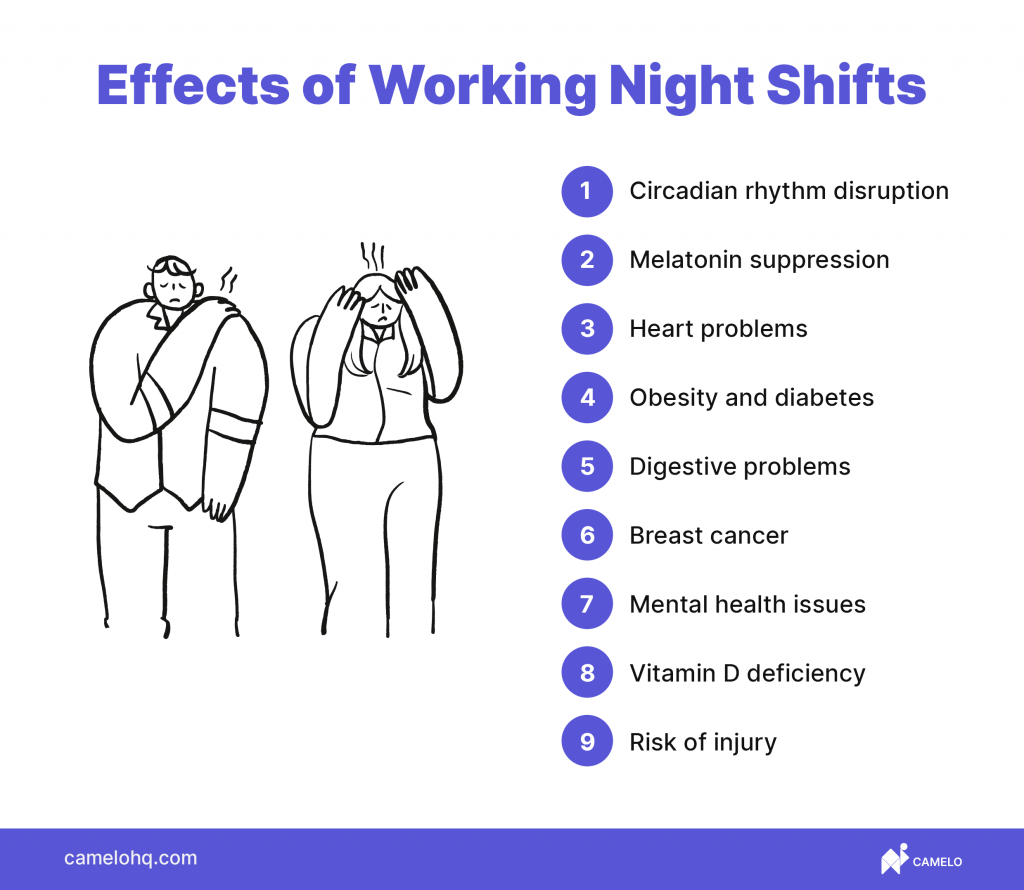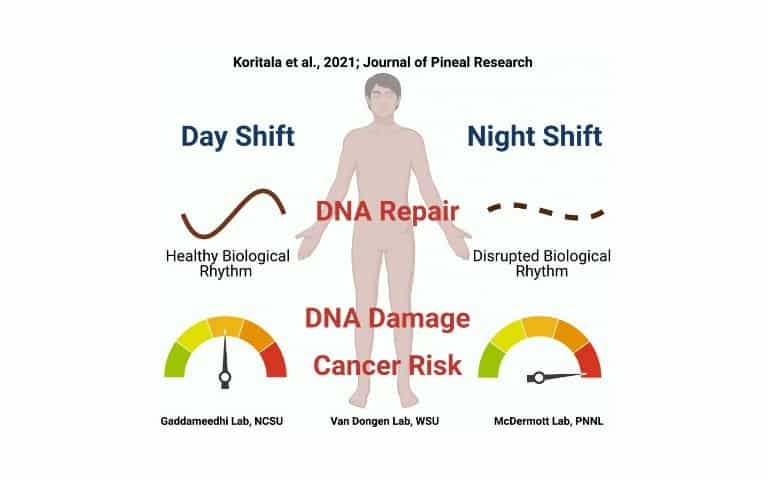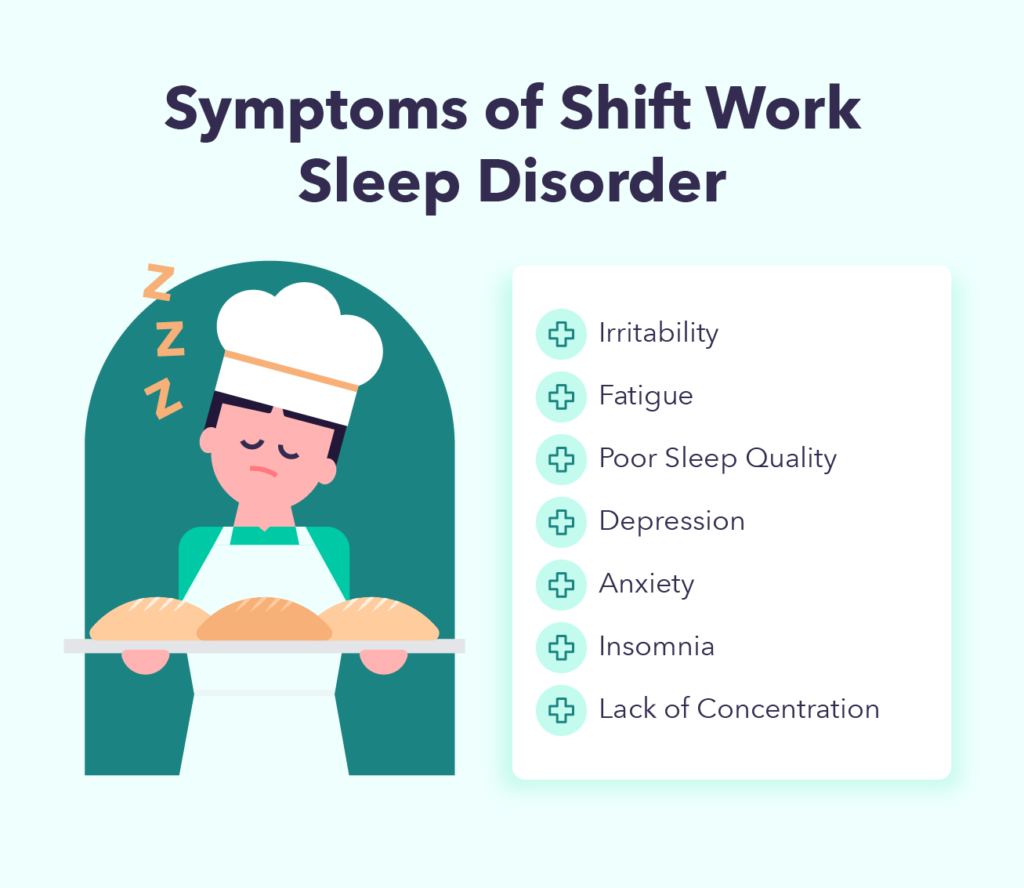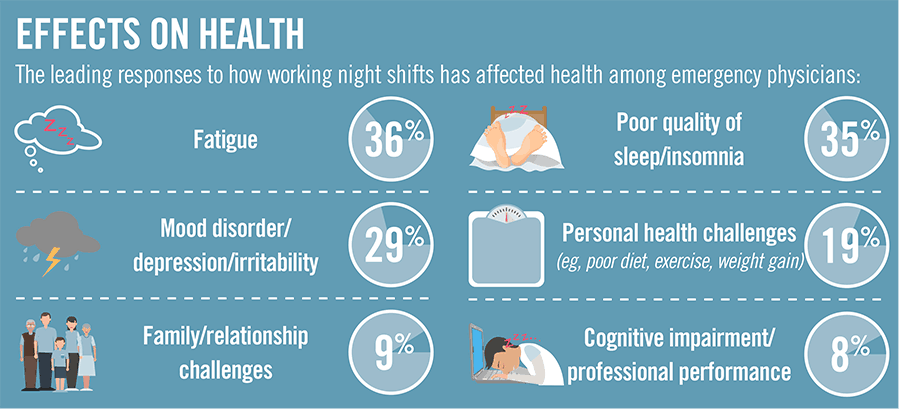Are you a night owl who works the night shift? Ever wondered if your nocturnal lifestyle is taking a toll on your health? In this article, we explore the potential effects of working the night shift on your overall well-being. From sleep disruptions to increased risk of chronic conditions, we shed light on the possible impacts of this unique work schedule. So grab a cup of coffee, sit back, and let’s uncover just how your night shift might be impacting your health.
Physical Effects
Increased risk of chronic diseases
Working night shifts can significantly increase your risk of developing chronic diseases. Studies have shown that individuals who work during the night are more prone to conditions such as diabetes, heart disease, and obesity. The disruption to your body’s natural circadian rhythm, which regulates various bodily functions, including metabolism and hormone production, can contribute to these health issues. It is essential to be aware of these risks and take proactive measures to mitigate them.
Sleep disruption and fatigue
One of the most immediate and noticeable effects of working night shifts is sleep disruption and fatigue. Your body’s natural sleep-wake cycle is regulated by the circadian rhythm, which functions optimally during the night. When you work overnight, your sleep patterns are interrupted, and it can be challenging to maintain a regular sleep schedule. This can lead to decreased sleep quality, increased daytime sleepiness, and overall fatigue, impacting both your physical and mental well-being.
Digestive issues
Working during the night can also wreak havoc on your digestive system. Your body is accustomed to specific eating patterns, and when you disrupt this routine by eating late at night or during odd hours, it can lead to digestive problems like acid reflux, indigestion, and constipation. Additionally, night shift work may cause irregular bowel movements, further aggravating digestive issues. Being mindful of your dietary choices and establishing a consistent eating schedule can help alleviate these problems.
Weight gain
The disrupted sleep and irregular eating patterns associated with working night shifts can contribute to weight gain. Lack of sleep alters the hormones responsible for appetite regulation, causing an increase in cravings for unhealthy, high-calorie foods. Moreover, reduced physical activity during nighttime hours can also contribute to weight gain. It is crucial to prioritize a healthy diet, engage in regular exercise, and consciously make efforts to maintain a healthy weight while working night shifts.
Increased risk of accidents
The altered sleep-wake cycle and overall fatigue associated with night shift work can significantly increase the risk of accidents. Studies have shown that individuals working night shifts are more prone to errors, accidents, and injuries, both at work and during their commute. The impaired cognitive function, decreased alertness, and slower reaction times due to sleep deprivation and fatigue make it vital to prioritize safety measures, such as taking regular breaks, staying alert while driving, and ensuring a safe work environment.
Mental Effects
Increased risk of mental health disorders
Working night shifts can have a significant impact on your mental health, increasing the risk of mental health disorders such as depression, anxiety, and mood disorders. The disruption to your sleep pattern alone can cause chronic sleep deprivation, which is closely linked to poor mental health outcomes. Moreover, the isolation and detachment from regular social activities and interactions that often accompany night shift work can also contribute to feelings of loneliness and emotional distress. It is crucial to prioritize self-care, seek support when needed, and maintain open communication about your mental well-being.
Cognitive impairment
Sleep disruption and fatigue associated with working night shifts can have detrimental effects on cognitive function. Reduced sleep quality can impair memory, attention, and decision-making skills, making it difficult to concentrate and perform tasks efficiently. This cognitive impairment can extend beyond work hours, affecting your daily life and overall productivity. It is essential to prioritize adequate rest and engage in activities that promote cognitive health, such as puzzles, reading, and brain exercises.
Emotional disturbances
Night shift work can lead to emotional disturbances such as mood swings, irritability, and heightened stress levels. The disruption to your body’s natural circadian rhythm can result in hormonal imbalances and increased levels of the stress hormone cortisol, which can negatively impact your emotional well-being. Additionally, the strain of working during nighttime hours, away from the usual daily routines and normal social interactions, can further exacerbate emotional disturbances. Practicing stress management techniques, maintaining a healthy work-life balance, and seeking emotional support can help mitigate these effects.
Decreased job satisfaction and productivity
Working night shifts can have a significant impact on job satisfaction and productivity. The irregular sleep patterns, fatigue, and disrupted social life can lead to decreased motivation and job satisfaction, affecting overall work performance. The lack of interaction with colleagues and limited opportunities for career advancement can also contribute to feelings of dissatisfaction. It is essential to find ways to maintain a positive attitude, establish healthy work routines, and communicate with employers about potential adjustments that could improve your overall job satisfaction and productivity.

This image is property of blog-assets.camelohq.com.
Social Effects
Social isolation and reduced quality time with loved ones
One of the most challenging aspects of working night shifts is the social isolation it can cause. While others engage in social activities and spend time with loved ones during normal waking hours, you may find yourself restricted to a different schedule. This can lead to feelings of loneliness and a sense of missing out on important events and gatherings. It is crucial to communicate your schedule needs with friends and family, plan quality time together when possible, and seek social support from other night shift workers who understand your unique situation.
Disruption of daily routines and activities
Working night shifts can disrupt your daily routines and activities. While others enjoy leisure activities during the day, you may find yourself needing to sleep or catch up on rest. This misalignment with societal norms can lead to difficulty scheduling appointments, attending social events, and participating in activities that are only available during regular business hours. Finding ways to adapt your routine and prioritize self-care, leisure, and personal commitments can help mitigate the disruptions caused by night shift work.
Negative Impact on Relationships
Strained relationships with family and friends
Working night shifts can strain relationships with family and friends. The conflicting schedules can result in limited quality time together, communication challenges, and a lack of understanding or empathy from loved ones who may not fully grasp the demands of night shift work. It is crucial to prioritize open and honest communication with your loved ones, express your needs and challenges, and seek mutual understanding and support to nurture and maintain healthy relationships.
Communication and coordination challenges
Coordinating schedules and effectively communicating can be a challenge for those working night shifts. While others typically communicate and plan during the day, you may find yourself asleep or unavailable. This can result in missed messages, difficulty making plans, and frustration for both you and your loved ones. Utilizing technology, such as shared calendars and messaging apps, can aid in coordination and communication efforts. Regularly updating your availability and finding alternative means of connection, even if it’s during unconventional hours, can help reduce communication challenges and maintain strong relationships.

This image is property of neurosciencenews.com.
Higher Risk of Substance Abuse
Increased likelihood of alcohol and drug use
Working night shifts has been associated with an increased likelihood of alcohol and drug use. The irregular sleep patterns, isolation, and stress associated with night shift work can lead some individuals to turn to substances as a coping mechanism. While it may provide temporary relief, relying on these substances can lead to dependency and addiction, further exacerbating health and well-being issues. It is essential to find healthy coping mechanisms, such as engaging in hobbies, seeking support from loved ones, and practicing stress management techniques, rather than turning to substances.
Dependency and addiction issues
The heightened risk of substance abuse associated with night shift work can contribute to dependency and addiction issues. The altered sleep-wake cycle and the resulting impact on mental health can make individuals more vulnerable to addiction. Recognizing the signs of addiction, seeking professional help, and accessing resources and support systems are crucial steps in addressing dependency issues. It is essential to prioritize your well-being and seek assistance when needed to overcome addiction challenges and regain control of your life.
Effects on Women’s Health
Disruptions to menstrual cycles
Working night shifts can disrupt women’s menstrual cycles. The disturbance to the body’s natural circadian rhythm can impact hormone production and, consequently, menstrual regularity. Irregular periods, changes in flow, and increased menstrual pain have been reported among women working night shifts. It is crucial for women to track their menstrual cycle, communicate any changes or concerns with their healthcare providers, and prioritize self-care measures that promote menstrual health, such as maintaining a healthy diet and managing stress.
Increased risk of fertility issues and complications during pregnancy
Night shift work has been associated with an increased risk of fertility issues and complications during pregnancy for women. The disruption to the body’s natural rhythm and potential impacts on hormone production can contribute to difficulties in conceiving. Once pregnant, night shift work may elevate the risk of complications such as preterm birth, low birth weight, and pregnancy-related hypertension. It is important for women planning to conceive or already pregnant to consult with their healthcare providers regarding the potential risks and strategies to maximize reproductive health and ensure a healthy pregnancy.

This image is property of blog.mint.com.
Increased Stress Levels
Difficulty managing stress
Night shift work can significantly increase stress levels due to various factors such as sleep disruption, social isolation, and cognitive demands. The constant adjustment to irregular sleep patterns and the strain of adapting to a different daily routine can lead to chronic stress. It is essential to develop effective stress management techniques such as mindfulness, exercise, and seeking support from loved ones or professional resources. Prioritizing self-care is key to mitigating the negative effects of stress associated with night shift work.
Higher levels of anxiety and depression
Working night shifts can contribute to higher levels of anxiety and depression. The disruption to the body’s natural circadian rhythm, reduced social interaction, and the strain of adapting to non-traditional work hours can give rise to feelings of anxiety and depression. It is crucial to prioritize mental health, engage in activities that promote well-being, and seek professional help if necessary. Regular exercise, maintaining a healthy diet, maintaining a consistent sleep routine, and nurturing social and emotional connections can help alleviate anxiety and depression symptoms.
Impact on Sleep Quality
Sleep disorders like insomnia
Working night shifts can contribute to the development of sleep disorders such as insomnia. The misalignment of sleep patterns with the body’s natural circadian rhythm can disrupt the ability to fall asleep, stay asleep, or achieve a restful sleep. The resulting insomnia can further worsen physical and mental health conditions. Establishing a consistent sleep schedule, creating a conducive sleep environment, and implementing relaxation techniques before bedtime can help promote better sleep quality and alleviate insomnia symptoms.
Reduced ability to achieve deep and restorative sleep
Night shift work can significantly impact your ability to achieve deep and restorative sleep. The disruption to your body’s natural sleep-wake cycle and the presence of external stimuli during your designated sleep hours can prevent you from experiencing the deep stages of sleep necessary for rejuvenation. This can lead to feelings of perpetual tiredness and low energy levels. Prioritizing an uninterrupted sleep environment, implementing relaxation techniques, and creating a consistent routine can optimize your chances of achieving deep and restorative sleep despite working night shifts.

This image is property of d2jx2rerrg6sh3.cloudfront.net.
Effects on Physical Appearance
Premature aging
Working night shifts can contribute to premature aging. The disruption to your body’s natural circadian rhythm can affect the production of collagen and elastin, essential proteins that maintain the skin’s elasticity and youthful appearance. Additionally, inadequate sleep and chronic fatigue can lead to dull skin, dark circles, and fine lines. Prioritizing a healthy lifestyle, staying hydrated, practicing a skincare routine, and protecting your skin from sun damage can help mitigate premature aging caused by night shift work.
Skin problems
Night shift work has also been associated with an increased risk of skin problems. The disrupted sleep patterns and altered circadian rhythm can lead to imbalances in hormone levels and increased inflammation, potentially exacerbating conditions such as acne, eczema, and psoriasis. Furthermore, the exposure to artificial lighting and potentially harsh work environments can further impact skin health. Prioritizing stress management, maintaining a consistent skincare routine, avoiding triggers specific to your skin condition, and seeking dermatological care when necessary can help manage and prevent skin problems associated with night shift work.
Tips for Managing Night Shift Work
Establish a consistent sleep schedule
Maintaining a consistent sleep schedule is crucial when working night shifts. Establish designated sleep hours that align with your work schedule and stick to them as closely as possible. This consistency helps regulate your body’s internal clock and improve sleep quality.
Create a conducive sleep environment
Ensure your sleep environment is dark, quiet, and comfortable. Invest in blackout curtains or wear an eye mask to block out light, use earplugs or white noise machines to mask external noise, and choose a supportive mattress and pillows for maximum comfort.
Practice healthy eating habits
Despite the irregular eating patterns that come with night shift work, it’s essential to prioritize healthy eating habits. Plan your meals ahead, choose nutritious, balanced options, and avoid relying on sugary or processed foods for quick energy. Be mindful of portion sizes and try to eat at regular intervals to maintain optimal digestion.
Engage in regular physical activity
Regular physical activity is essential for overall well-being, including when working night shifts. Find time for exercise during your awake hours, whether it’s before or after work. Exercise not only improves physical health but also promotes better sleep quality and mood regulation.
Manage stress effectively
Working night shifts can be stressful, so it’s vital to manage stress effectively. Find stress management techniques that work for you, such as mindfulness meditation, deep breathing exercises, journaling, or engaging in hobbies and activities that bring you joy and relaxation. Prioritize self-care and take breaks to recharge, both physically and mentally.
Seek social support
Connect with fellow night shift workers who understand the unique challenges you face. Seek social support from loved ones and friends who can offer understanding, empathy, and companionship despite the different schedules. Share experiences, tips, and coping strategies to help navigate the demands of night shift work together.

This image is property of www.physiciansweekly.com.
